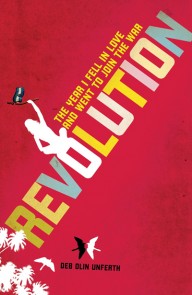6 Books: Deb Olin Unferth on Nonfiction
 In this week’s installment of 6 Books, Deb Olin Unferth, author of the brilliant, laconic memoir Revolution, recommends 6 nonfiction books. Here are her picks:
In this week’s installment of 6 Books, Deb Olin Unferth, author of the brilliant, laconic memoir Revolution, recommends 6 nonfiction books. Here are her picks:
To After That (Toaf) by Renee Gladman
It’s a book dedicated to a book she has written: what is a cooler premise than that?
Parrots for Dummies by Nikki Moustaki
Yes, from the Dummies series, a simple how-to book: feeding, cleaning the cage, etc., but stay with me here. I found the book very moving. Her portrait of the parrot is of a tragic figure in a cage—it feels almost Kafkaesque. She captures the personality of the parrot as a beautiful, complex, panicky person who you’d do anything for in hopes that it’ll fall in love with you. And there’s also the sadness of the author, who you can tell is struggling: she has to write about clipping, though she mostly hates it. She has to talk about breeding though she thinks it’s a terrible idea. She includes pictures of birds flying in the Amazon—there, isn’t that beautiful? Isn’t that where they belong? They fly a hundred miles a day out there, while here they can move only a few feet. Which is better for them, do you think? she wonders.
Changing My Mind by Zadie Smith
This book has shown up on so many lists now that it’s almost like putting Consider the Lobster on this list. But I’m including it here because you know what? Zadie Smith is a badass.
The Autobiography of Alice B. Toklas, by Gertrude Stein
 This may be my favorite book of all time. This is the book that made all my short shorts possible, that made my memoir, Revolution, possible. I first read it riding a train to Chicago and I’ve never been the same. How to write about war and make it funny. How to write about furniture and make it sad.
This may be my favorite book of all time. This is the book that made all my short shorts possible, that made my memoir, Revolution, possible. I first read it riding a train to Chicago and I’ve never been the same. How to write about war and make it funny. How to write about furniture and make it sad.
A Giacometti Portrait, by James Lord
For Lord—who agreed to sit for a portrait for Giacometti—what initially seemed like a pleasant afternoon turned into an existential nightmare, as Lord discovered just what “finishing” a portrait meant to Giacometti.
Atlas of Remote Islands, by Judith Schalansky
How can descriptions of islands far, far away—islands that I’ll never visit, islands that the author has never visited—feel so lonely?
